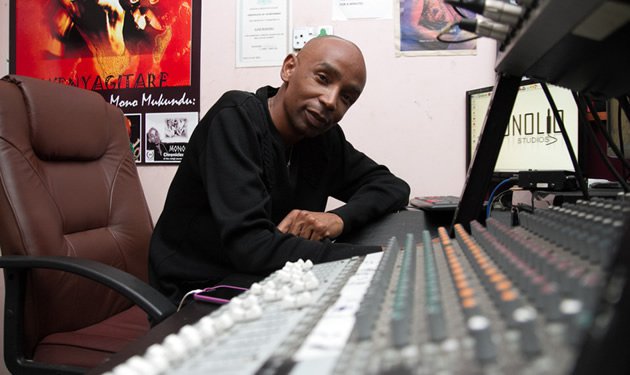By Maxwell Sibanda
While other teens of his age received corporal punishment from their parents because of mischief or bad behaviour, Clive Mukundu’s father would beat him for playing musical instruments. It couldn’t deter him from pursuing his passion.

The talented guitarist played for more than 20 music bands as he searched for his destiny, before finally settling at his Monolio Studios in 2007.
In 2003, Mono joined the late music superstar and national hero Oliver Mtukudzi and the Black Spirits band as a guitarist, touring around the world and in the process recording four albums with the band.
In 2008, he toured Europe with the late mbira songbird, Chiwoniso Maraire. Recently, he was part of Chimurenga music guru Thomas Mapfumo’s backing band as he sojourned on his December “Peace Tour” that saw him transverse the whole country.
Another career highlight was in 1994 when Mono converted to Christianity and joined Egea Gospel Train — the band that included Ivy Kombo, Annie Kombo and Carol Mujokoro. They recorded the album Ndinokudai Jesu and toured around Zimbabwe and Mozambique, conducting outreach programmes.
He later left Egea Gospel Train and worked with many other artists until he established his own musical home. Ever since Mono established his Monolio Studios, he has produced local singers Hope Masike, Jah Prayzah, Transit Crew, Suluman Chimbetu, Alexio Kawara and Tocky Vibes.
Outside Zimbabwe, he has also produced Luciano (Jamaica), Jane Osbourne (Zambia), Dereck Mpofu (South Africa) and Joseph Tembo (Malawi). As a guitarist, he has recorded with the late Mtukudzi, Somandla Ndebele, Shingisai Suluma, Lufuno Dagada (South Africa) and Mango Groove (South Africa).
Mono has a fascinating musical history. At age nine, it was already evident that the young Clive was destined for a music career as he, against his father’s wish, made his first home-made tin guitar which he played in private.
Known today in the music circuit with the stage name “Mono”, he recalls his early days: “During my high school days I had a single dreadlock (Mono-lock) hairstyle that earned me the nickname Mono from my peers. It stuck on me from then. And it has been my stage name since.”
Born on September 15, 1970 in the small town of Rusape to parents George Mukundu and Joyce Gwatidzo, he is married to Jean Kandeya Mukundu and they have two children, Tariro Nyasha and Takakunda. Mono grew up in Harare’s high density suburbs of Kambuzuma, Kuwadzana and Mufakose.
The music producer, composer and multi-instrumentalist is also a published writer having released an auto-biographical “Following the Melody” in 2017 and, “Poor and Famous” in 2018 which he highlights the struggles faced by Zimbabwean musicians and gives advice on how artists can handle certain situations in the music industry.
But it is Mono’s exploits as a music producer and lead guitarist that have made him one of the most sought-after artist in Zimbabwe.
Speaking to the Daily News on Sunday, Mono said in 1988, at age 17, he met Last Saidi, a bass player who taught him his first three chords on a standard guitar. “After that I went on to teach myself how to play the lead guitar by copying other guitarists on radio and other guitarists I came in contact with.
“I then learnt how to play the standard guitar and formed my first band Sarungano Chanters which unfortunately failed more than 10 record deal auditions. This development affected the band members and led to the group’s disbandment at the end of 1989.”
Mono went on to join Chax Brothers comprising band members, the late Admire Kasenga and Jackson Phiri.
“The band played sungura, reggae and mbira music but I left the outfit in 1990 and co-founded the band Chikokoko which was based in Mutare. We performed first at Tsvingwe Bar in Penhalonga and then at Dangamvura Hotel.”
Mono then left Mutare at the end of 1991 and recorded the album Ruvengo in 1992 before joining the Seasons band which performed around Harare and Mutare backing Patrick Mukwamba from April to August 1992. “I co-founded the reggae band Rough Mix Club with friends Webster Kunaka, Everisto Jack and Wellington Masvosva performing around Harare and Bulawayo.”
Mono went on to join and perform with several bands, among them Peter Tembo & The Scanners International, Dendemaro, John Ali & Marakashi band that played Congolese rhumba and soukous and Kwasa-Kwasa Kings yet another band that played Congolese rhumba.
“In 1995 I joined Christian Life Centre church (now known as Faith in God church) as a gospel outreach musician for their band Clicet Crusaders. We recorded one album and toured around Zimbabwe, Mozambique, Zambia and Malawi.” In 1999 Mono left Christian Life Centre Church and joined Revival Ministries as a fulltime church musician.
“In March 2000 I left Revival Ministries and joined Crossline Music, a Christian outreach group. I left in 2000 to concentrate on session work.” In 2001 Mono enrolled at the Zimbabwe College of Music for the national certificate in music programme and graduated in 2002. He was crowned with Best Guitar Student award.
“After graduation I taught guitar at the same College of Music, then at Prince Edward School and at Don Bosco Youth Training Centre. I also worked part time as a music producer for Ngaavongwe Records,” said Mono.
He has released solo albums; Anosimudza Marombe 2001, Jesu Neni 2002, Poor & Famous 2006, Super Ngezha 2007; Zivai Zvekuchema 2009, Forty 2010, Tunziyo for Jean 2012, Chronicles of a rough journey 2013, Gwenyagitare 2016 and Acoustic re-visit 2018. DailyNews






